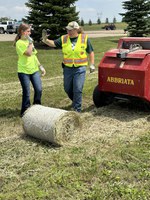Dates set for NDSU Extension youth farm safety camps
(Click the image below to view a high-resolution image that can be downloaded)
According to the National Children’s Center for Rural and Agricultural Safety and Health, young workers were 7.8 times more likely to be fatally injured in agriculture when compared to all other industries combined in 2016. Tractors and all-terrain vehicles are the leading sources of fatal events. When it comes to youth fatalities on the farm, 47% involved transportation, which includes tractors, 20% involved contact with machinery, and 13% involved violent contact with animals on a farm. In 2021, the annual cost of childhood agriculture-related deaths was $605 million with non-fatal agriculture-related injuries at $1.4 billion.
“These sobering statistics highlight the need for more training and education when it comes to having youth work on farms,” says Angie Johnson, North Dakota State University Extension farm and ranch safety coordinator. “NDSU Extension provides youth farm worker certification training that meets the U.S. Department of Labor Hazardous Occupations Order in Agriculture (HOOA) requirements for 14-to-15-year-olds to be able to legally work on a farm other than their own family’s operation.
Youth will be able to learn about safe farm and ranch practices and earn their certifications during three statewide farm safety camps that NDSU Extension is hosting this year. Camp dates and locations are:
- May 21-23, Minot State University Campus, Minot
- May 29-31, Lake Region State College Campus, Devils Lake
- June 25-27, Bismarck State College Campus, Bismarck
The three-day, two-night camps cover the basics of safe tractor and machinery operation, general farm hazards, livestock handling, use of personal protective equipment, and basic first-aid and first-response procedures.
“These camps help teens become familiar with the most serious hazards associated with operating tractors and agricultural machinery, along with the fundamentals of safe operation and maintenance,” says Johnson, who is collaborating with NDSU Extension agents to conduct the camps.
Participants will receive hands-on experience and learning opportunities, including:
- Safe tractor operation, including a tractor driving obstacle course
- Livestock handling
- All-terrain vehicle safety, including ATV certification
- Skid steer operation
- Roadway safety using rules of the road
- Farm first-aid and emergency preparedness
- Laws related to youth working in agriculture
- Equipment operation and maintenance
- Farm stress management skills
- Farm hazard identification
Youth will have opportunities for hands-on learning, including utilizing farm equipment on obstacle courses to simulate actual farm situations. Livestock handling sessions will allow participants to interact with animals and learn more about animal behaviors and safety when working with animals. ATV certification and Stop the Bleed certification are also included.
Federal law under the HOOA requires that youth under the age of 16 receive certification of training prior to employment on farms operated by anyone other than a parent or guardian. The program is for youth 14 and 15 years old. Youth who are 13 can participate, and the certification they receive will become valid when they turn 14.
By successfully passing this program, which includes a final exam, participants will receive official certification to operate tractors over 20 horsepower, and some pieces of farm machinery when working for a farmer or rancher outside of the family’s operation.
“While this certification is not required for youth to work on their own family farm, we encourage all teens who plan to work on a farm to participate in this program,” says Johnson. “These camps are designed to strengthen communication skills between parents, employers and teen workers on the farm. Farm safety training prepares the next generation of the workforce with the safety skills needed to prevent injuries and fatalities on the job.”
Thomas Jewett, a teenager from Barnes County, has attended the NDSU Extension farm safety camp for two years. Because of his participation, he says his family’s operation has changed for the better.
“Our organization has improved as we discussed farm safety issues, addressed safety items needing to be fixed, and reviewed our farm safety plan,” Jewett says. “I want to make sure that when my family farms, we are safe. Farm safety camp helps with this.”
Camps are open to youth from all counties in North Dakota. Youth do not need to be enrolled in 4-H to participate.
Registration opens March 15 and the deadline to register is April 15. The cost of each camp is $300. Registration for all three camps can be found online at ndsu.ag/youthfarmsafety.
Sponsorships from businesses and organizations provide personal protective equipment and farm safety supplies for camp participants. Contact Johnson at angela.b.johnson@ndsu.edu to learn more about current sponsorship opportunities.
For more information regarding farm safety camp, please contact your local NDSU Extension agent.
NDSU Agriculture Communication – March 15, 2024
Source: Angie Johnson, 701-231-1873, angela.b.johnson@ndsu.edu
Editor: Elizabeth Cronin, 701-231-7006, elizabeth.cronin@ndsu.edu


